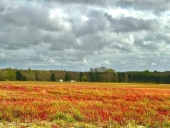
 1
1




Farmer Iain Tolhurst demonstrates how people can be fed with food grown stockfree, organically, ethically and sustainably.
Iain Tolhurst has been a commercial organic grower since the mid 1970s. He advises on all aspects of organic conversion and production systems in the UK and overseas. He works with Horticultural International, Garden Organic, Elm Farm Research Centre, Plunkett Foundation and Transrural Trust.
Produced by David Graham. Made with a grant from the Cyril Corden Trust.
How permies.com works
What is a Mother Tree ?




Success has a Thousand Fathers , Failure is an Orphan
LOOK AT THE " SIMILAR THREADS " BELOW !
 1
1








"Permaculture is a philosophy of working with, rather than against nature; of protracted & thoughtful observation rather than protracted & thoughtless labour; & of looking at plants & animals in all their functions, rather than treating any area as a single-product system."-Bill Mollison




 ? is a good step forwards...
? is a good step forwards...'Theoretically this level of creeping Orwellian dynamics should ramp up our awareness, but what happens instead is that each alert becomes less and less effective because we're incredibly stupid.' - Jerry Holkins
 1
1




I don't guess they count the worm castings as animal manure then?
How permies.com works
What is a Mother Tree ?




This was made for the Vegan Organic Network
'Theoretically this level of creeping Orwellian dynamics should ramp up our awareness, but what happens instead is that each alert becomes less and less effective because we're incredibly stupid.' - Jerry Holkins




The text of this work may be reproduced or quoted from for non-profit purposes provided the title, authors, ISBN number and the website www.veganorganic.net are given as the source. Illustrations and photographs are copyright to their originators.
1.3 Defining stockfree
Stockfree as a term was introduced in 2000. It is a description of an organic method of growing food without the use of animal inputs. It is an adaptation of the word 'stockless' commonly used by organisations like the independent Elm Farm Research Centre (EFRC) based in Newbury, Berkshire, to denote all arable farming.
Research into commercial stockfree-organic agriculture arose not for compassionate reasons but through economic necessity. This becomes a common theme in understanding the importance of UK-wide (macro) stockfree adoption. The Elm Farm stockless trials came about in the early 1990s because of the lack of farmyard manure in the arable eastern counties like Norfolk and South Lincolnshire. The lack of livestock inputs was proving a significant barrier to getting farmers to convert to organic grain production.
The Stockfre-Organic Standards (available at www.stockfreeorganic.net) were agreed in 2004 and revised in 2007. They provide the first guidelines for stockfree-organic systems and are further elaborated on in this book.
How permies.com works
What is a Mother Tree ?




Yes, it is certainly not as beneficial as permaculture. Like I said before, it is trapped in the organic science of around the 1970's and before. That's a huge improvement over conventional ag which is stuck in the paradigms of the 50's and 60's. Everything Iain Tolhurst does, I did myself over 35 years ago. The rotations, the green manures, the fallow years, all of it and more. The science behind various organic methodologies has advanced quite a bit since then though. Take for example the discovery of glomalin wasn't until 1996 and research on its importance is still ongoing. The plant communications set up by the Mycorrhizal networks extending the rhizosphere is ongoing research too. The idea of taking holism in science to working technological systems in agriculture to take advantage of these raw scientific advances in biology is in it's infancy. There are still multiple biochemical cycles in the soil that we still have no idea where exactly they happen. I think a lot of the world has no idea how far ahead of his time Bill Mollison actually was in developing his agricultural models before even all the raw science had a chance to catch up. It still hasn't completely caught up! We know it works because of the systems science approach of Mollison. But confirming all the individual pathways as to why is still many decades away.Burra Maluca wrote:This was made for the Vegan Organic Network - it's not claiming to be permaculture.
There are a lot of people that don't want to involve livestock in their systems and I think those people will find much of interest in the video. He's written a book too, which I have just received and will be reviewing very soon.
For myself, I'm not vegan, yet. And I do incorporate domestic animals into my system. But as I get older I can imagine the animals here taking a smaller and smaller role and it's nice to know that it's not absolutely imperative that I keep them.
"Permaculture is a philosophy of working with, rather than against nature; of protracted & thoughtful observation rather than protracted & thoughtless labour; & of looking at plants & animals in all their functions, rather than treating any area as a single-product system."-Bill Mollison

|
A tiny monkey bit me and I got tiny ads:
A rocket mass heater heats your home with one tenth the wood of a conventional wood stove
http://woodheat.net
|



